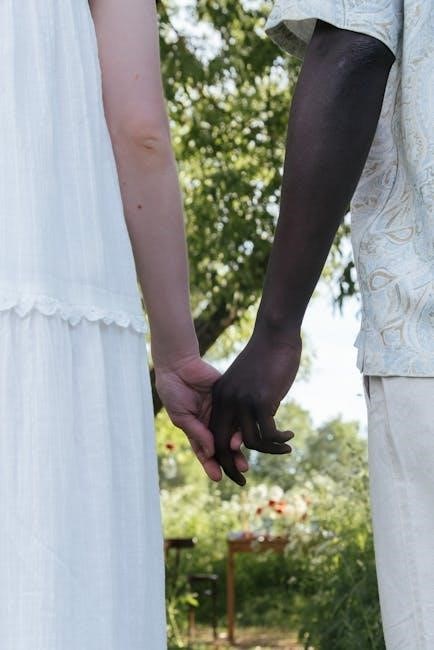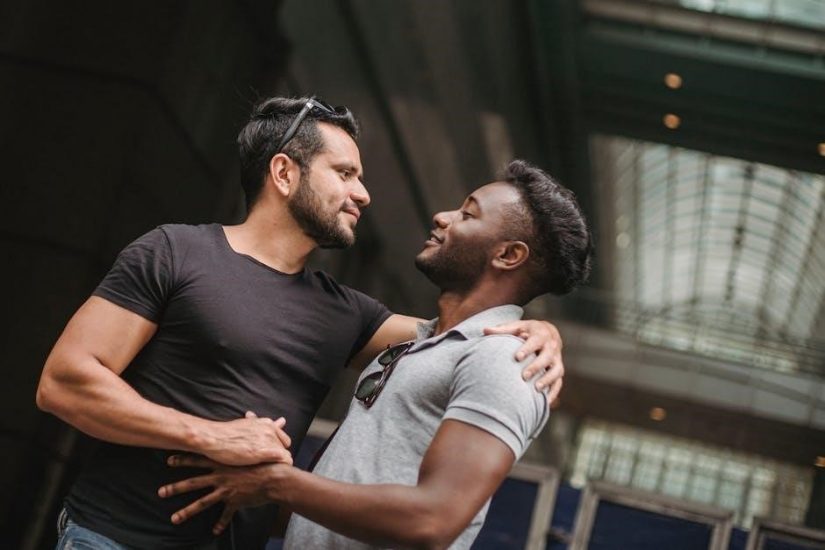The Black Man’s Guide to Understanding the Black Woman‚ written by Shahrazad Ali in 1989‚ offers insights into fostering meaningful dialogue and mutual respect in relationships. It explores historical dynamics‚ societal influences‚ and strategies for building stronger connections between Black men and women.
Overview of the Guide’s Purpose
The guide aims to foster understanding and unity between Black men and women by addressing historical traumas‚ societal influences‚ and relationship dynamics. It provides tools for recognizing red flags and navigating challenges‚ promoting harmony and mutual respect. The book emphasizes the importance of dialogue and self-awareness in building healthier‚ more fulfilling relationships.
Importance of Mutual Understanding in Relationships
Mutual understanding fosters empathy‚ respect‚ and harmony in relationships. By acknowledging each other’s perspectives and experiences‚ Black men and women can bridge gaps and build stronger bonds. This understanding is key to addressing challenges and creating a supportive environment where both partners thrive‚ leading to healthier‚ more fulfilling connections and shared growth.
Shahrazad Ali‚ a prominent author‚ focuses on addressing dynamics within Black relationships through her works. Her book‚ The Blackman’s Guide to Understanding the Blackwoman‚ sparks dialogue on unity‚ respect‚ and harmony. Ali’s writing emphasizes cultural heritage and mutual growth‚ encouraging Black men and women to overcome historical traumas and societal challenges together.

Historical Context of Black Relationships
The legacy of slavery profoundly shaped Black relationships‚ fostering trauma and cultural dynamics that continue to influence interactions today‚ as explored in Shahrazad Ali’s work.
The Impact of Slavery on Black Relationships
Slavery profoundly disrupted Black family structures‚ creating lasting emotional and psychological trauma. It imposed oppressive dynamics that continue to influence relationships‚ as explored in Shahrazad Ali’s work‚ highlighting the need for understanding and healing.
Historical Trauma and Its Effects on Dynamics
Historical trauma‚ rooted in slavery and systemic oppression‚ has shaped the dynamics between Black men and women. Shahrazad Ali’s work highlights how these unresolved wounds manifest in modern relationships‚ emphasizing the importance of acknowledging and addressing these issues to foster healing and unity.
Cultural Narratives Shaping Black Relationships
Cultural narratives‚ deeply influenced by historical and societal factors‚ play a significant role in shaping Black relationships. These narratives often reflect resilience and strength but can also perpetuate stereotypes. Understanding and challenging these narratives is crucial for fostering healthier and more authentic connections between Black men and women.
Common Misconceptions and Stereotypes
The guide addresses common misconceptions about Black women‚ emphasizing the need to move beyond stereotypes. It highlights how false narratives can hinder genuine understanding and connection in relationships.
Debunking Myths About Black Women
The guide challenges common stereotypes about Black women‚ emphasizing their diversity and individuality. It addresses misconceptions rooted in societal biases‚ promoting a deeper understanding of their experiences and perspectives. By countering myths‚ the text encourages Black men to see beyond surface-level perceptions and foster more authentic connections.
Avoiding Generalizations in Understanding
The guide emphasizes the importance of moving beyond stereotypes and recognizing the unique experiences of each Black woman. It highlights that generalizations can hinder genuine understanding‚ urging readers to appreciate individuality and avoid reducing complex personalities to oversimplified narratives. This approach fosters deeper connections and mutual respect in relationships.
The Role of Media in Shaping Perceptions
Media often perpetuates stereotypes about Black women‚ such as the “angry Black woman” or hypersexualized narratives‚ which can distort perceptions. These portrayals influence how Black men view Black women‚ creating misunderstandings. The guide encourages looking beyond media-driven caricatures to foster genuine understanding and connection‚ emphasizing the importance of individual experiences over generalized representations.

Psychological and Emotional Aspects
The emotional landscape of Black women is shaped by resilience and strength‚ often rooted in historical and societal challenges. Understanding these dynamics fosters deeper empathy and connection in relationships.
Understanding the Emotional Landscape of Black Women
Black women’s emotional landscapes are deeply influenced by resilience and strength‚ often developed through navigating societal challenges. Their experiences are shaped by historical trauma‚ cultural expectations‚ and personal resilience. Understanding these nuances requires empathy and open dialogue‚ allowing Black men to connect on a deeper‚ more meaningful level and foster mutual growth and support.
The Role of Resilience and Strength
Resilience and strength are central to the identity of Black women‚ shaped by historical adversity and systemic racism. These qualities enable them to thrive despite challenges‚ embodying a powerful form of survival and leadership. Recognizing this resilience fosters deeper understanding and appreciation‚ allowing Black men to support and celebrate their partners’ unwavering spirit.
Addressing Emotional Vulnerabilities
Understanding the emotional vulnerabilities of Black women involves acknowledging the impact of historical trauma and societal pressures. Creating a safe‚ empathetic space allows for open dialogue‚ fostering trust and connection. Recognizing these vulnerabilities requires patience and sensitivity‚ enabling Black men to offer support and validation‚ which strengthens emotional bonds and promotes mutual understanding and growth.

Communication Strategies
Effective communication involves active listening and empathy‚ fostering open dialogue. This guide emphasizes understanding without stereotypes‚ encouraging honest conversations to build trust and strengthen connections between Black men and women.
Effective Ways to Initiate Dialogue
Initiating dialogue requires empathy and openness. Active listening and non-judgmental questioning create safe spaces for expression. Shahrazad Ali’s guide suggests starting with shared experiences and cultural heritage to foster mutual understanding and connection‚ emphasizing respect and patience as foundational elements for meaningful conversations between Black men and women.
The Importance of Active Listening
Active listening is crucial for building trust and understanding. By fully engaging with her words and emotions‚ a man demonstrates respect and empathy. Shahrazad Ali emphasizes that truly hearing‚ rather than just responding‚ fosters deeper connections and resolves conflicts‚ strengthening the bond between Black men and women in meaningful ways every day.
Empathy as a Tool for Deeper Understanding
Empathy bridges gaps by allowing men to understand women’s challenges and emotions deeply. Shahrazad Ali highlights how historical trauma and societal pressures uniquely affect Black women. By fostering empathy‚ men can acknowledge these experiences‚ creating a foundation for mutual respect and unity‚ which is essential for healing and building stronger‚ more supportive relationships together.
Cultural Identity and Pride
Cultural identity and pride strengthen bonds between Black men and women‚ fostering unity through shared heritage and mutual respect‚ crucial for overcoming challenges and collective progress together.
The Role of Cultural Heritage in Relationships
Cultural heritage serves as a bridge‚ connecting Black men and women through shared traditions‚ values‚ and history. Understanding and embracing this legacy fosters unity‚ mutual respect‚ and a deeper appreciation for the richness of African descent‚ enriching relationships and strengthening bonds rooted in collective identity and pride.
Celebrating Shared Identity
Celebrating shared identity fosters unity and pride‚ acknowledging the collective experiences and resilience of Black men and women. By honoring cultural traditions and history‚ individuals strengthen their bond‚ creating a foundation of mutual respect and understanding. This shared identity becomes a source of empowerment‚ nurturing relationships rooted in camaraderie and a deep appreciation for their heritage.
Navigating Cultural Differences
Navigating cultural differences requires open dialogue and empathy‚ allowing both partners to understand each other’s unique backgrounds and perspectives. By embracing these differences‚ Black men and women can foster deeper connections and mutual respect‚ creating a harmonious relationship that celebrates their shared identity while honoring their individual cultural nuances and experiences.

Conflict Resolution Techniques
Conflict resolution involves understanding historical trauma and fostering open communication to address misunderstandings. By acknowledging past wounds and working collaboratively‚ Black men and women can strengthen their relationships and build unity.
Addressing Conflicts Constructively
Constructive conflict resolution involves active listening‚ empathy‚ and understanding historical trauma. By identifying triggers and acknowledging each other’s perspectives‚ Black men and women can address disagreements respectfully. Turning conflicts into opportunities for growth fosters mutual respect and strengthens relationships‚ promoting unity and harmony.
Understanding Triggers and Patterns
Recognizing emotional triggers and patterns rooted in historical trauma is key to fostering understanding. By acknowledging how systemic racism and societal pressures shape reactions‚ Black men and women can address conflicts with empathy. Identifying these dynamics helps break cycles of dysfunction‚ promoting healthier‚ more compassionate interactions and strengthening relationships.
Building Solutions Together
Building solutions together requires collaboration and a shared commitment to growth. By addressing challenges collectively‚ both partners can foster mutual respect and understanding. Understanding triggers and patterns helps create tailored solutions. This collaborative approach strengthens relationships and promotes harmony‚ ensuring both individuals feel valued and supported in their journey together.
The Role of Mutual Respect and Trust
Mutual respect and trust form the foundation of a healthy relationship. They foster open communication‚ understanding‚ and unity between Black men and women‚ strengthening bonds and harmony.
Foundations of a Healthy Relationship
Mutual respect‚ trust‚ and empathy are essential for building a strong connection. Open communication fosters understanding‚ while shared values and support create a nurturing environment. These elements help address past traumas and societal pressures‚ promoting unity and harmony between Black men and women‚ as emphasized in Shahrazad Ali’s guide.
Trust as a Cornerstone
Trust is the bedrock of any thriving relationship‚ fostering security and stability. It is cultivated through consistent actions‚ transparency‚ and vulnerability. Shahrazad Ali emphasizes the importance of reliability and accountability‚ urging both partners to honor commitments and communicate openly to strengthen trust‚ which is vital for overcoming challenges and building lasting harmony.
Respect in Action
Respect in action involves acknowledging and valuing each other’s contributions‚ fostering dignity and equality. Shahrazad Ali highlights the importance of consistent‚ genuine regard‚ ensuring both partners feel heard and appreciated. Mutual respect strengthens bonds‚ creating a foundation for open communication and cooperation‚ essential for navigating life’s challenges together and building enduring unity.
Societal Challenges and External Pressures
Societal challenges‚ including systemic racism and expectations‚ impact Black relationships. Navigating these pressures together fosters unity and resilience‚ essential for overcoming external obstacles and building strength collectively.
Systemic Racism and Its Impact
Systemic racism profoundly affects Black relationships‚ perpetuating inequality and mistrust. Historical oppression creates power imbalances‚ influencing dynamics between Black men and women. Addressing these structural issues is crucial for fostering mutual understanding‚ healing‚ and unity within the community‚ as highlighted in Shahrazad Ali’s work on navigating these challenges collectively and effectively.
Societal Expectations and Stereotypes
Societal expectations impose rigid roles‚ perpetuating stereotypes that strain Black relationships. Black women are often typecast as overly strong or aggressive‚ while men face hypermasculinity pressures. These narratives fuel misunderstandings and mistrust. Shahrazad Ali’s work challenges these biases‚ urging a rejection of limiting stereotypes to foster genuine connection and mutual respect in relationships.
Navigating External Pressures Together
Systemic racism and societal expectations create external pressures that strain Black relationships. Collaborative efforts to address these challenges are essential. By fostering unity and mutual respect‚ Black men and women can collectively navigate external pressures‚ countering stereotypes and building resilience together through open dialogue and shared understanding.
The guide emphasizes unity and mutual understanding as key to fostering healthy Black relationships. By addressing historical trauma‚ societal pressures‚ and fostering empathy‚ both partners can grow together‚ building a foundation of trust and respect for a stronger‚ more resilient connection.
Summarizing Key Takeaways
The Black Man’s Guide to Understanding the Black Woman highlights the importance of mutual respect and open dialogue. It encourages Black men to recognize historical and societal impacts‚ fostering empathy and unity. By addressing emotional landscapes and cultural identities‚ the guide provides tools for healthier‚ more resilient relationships‚ promoting collective growth and understanding.
Encouraging Continuous Growth
Continuous growth in relationships requires dedication to learning and self-reflection. The guide emphasizes the importance of understanding historical trauma and cultural narratives‚ fostering resilience and emotional intelligence. By embracing shared identity and addressing vulnerabilities‚ individuals can build stronger‚ more empathetic connections‚ leading to lasting unity and harmony in their relationships.
A Call to Action for Open Dialogue
A call to action for open dialogue encourages Black men and women to engage in honest communication‚ free from stereotypes and misconceptions. Shahrazad Ali’s work serves as a catalyst for this dialogue‚ urging individuals to seek understanding and unity. By fostering empathy and respect‚ they can collectively overcome historical and societal challenges‚ building stronger‚ more harmonious relationships.
